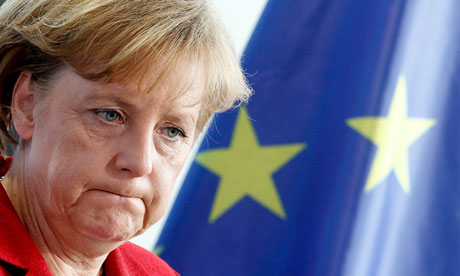William Keegan The Observer, Sunday 13 January 2013
Berlin bends over backwards to reassure Europe that it has no desire for domination. But its championing of misguided fiscal orthodoxy is dragging the whole continent down
Angela Merkel: latest in a long line of chancellors who want a European Germany, not a German Europe. Photograph: Tobias Schwarz/Reuters
The Conservative party is in such a state over Europe that the Obama administration has had to remind it in public that the much-treasured special relationship between Britain and the US depends these days on this nation's presence in the EU, rather than its defection.
Conservative sceptics who complain that this is not the kind of European Union that was envisaged when we entered need to go back in history. The idea that the wool has been pulled over the British public's eyes does not fit too easily with the public record of the late 60s and early 70s.
Indeed, in those days it was manifest that our fellow Europeans were aiming at monetary union by 1980. Older readers will remember the Werner Report, which set out the plans. Then came the breakup of the Bretton Woods fixed-but-adjustable exchange rate system, the first oil crisis, and the collapse of assorted stout parties.
Paradoxically, however, the disruption of earlier plans led, after a long time-lag, to the second attempt, as the European monetary system, inaugurated in 1978-79, prepared the way for the single currency of 1999 via the Single European Act of 1986, signed by that veritable mistress of detail, one Margaret Thatcher.
The EMS, better known for its principal component, the European exchange rate mechanism, was an attempt to create a "zone of monetary stability" in Europe in the face of Washington's benign neglect of relationships between countries' exchange rates. The dollar was no longer to be the linchpin of the system.
Many of us rather hoped that monetary union had been kicked into touch, but the fall of the Berlin Wall in 1989 and the reunification of Germany in 1990 aroused fears on the part of both President Mitterrand of France and Chancellor Kohl of Germany that Germany might become too dominant. With the sacrifice of the deutschmark, Germany signed up to the single currency, the political aim being the achievement of a European Germany, rather than a German Europe.
Contrary to the views of many people in this country, modern Germany bends over backwards to deny any suggestion of plans to dominate Europe. It was amusing last week to hear a senior executive of BMW, which now owns Rolls-Royce, going out of his way to insist that Rolls-Royce was still "a British company".
Ironically, however, it is easy for Germany's good intentions to be misinterpreted, because the way that economic policy has evolved in Europe since the onset of the financial crisis has been led by Germany and is based on the same false premise as the economic policy pursued by a certain coalition closer to home.
The premise is that austerity, or planned penury, contains the seeds of economic revival. "Expansionary fiscal contraction" is the oxymoronic term for what is being practised in the UK and most of the euro zone.
I have many times tried to point out that what makes sense for the individual or household does not make sense for the entire economy. As the indefatigable Paul Krugman puts it: "A family can decide to spend less and try to earn more. But in the economy as a whole, spending and earning go together: my spending is your income; your spending is my income. If everyone tries to slash spending at the same time, incomes will fall – and unemployment will soar."
After a period of selective amnesia, economists at the International Monetary Fund and elsewhere have rediscovered the "multiplier" – the insight given to Keynes by his lesser-known colleague Richard Kahn. Traditionally this is discussed in terms of the way that extra public spending or lower taxes can have a "multiplier" effect in stimulating demand and activity in the economy as a whole.
Now, for reasons that ought to have been obvious, they are discovering that the multiplier effect can work the other way as well. Why, the impact of needless austerity on peripheral euro zone countries is now affecting the outlook in Germany itself, via lower demand for its exports.
This is not to say that the contraction induced by the current fashion for austerity and cuts is entirely responsible for our economic troubles. In recent years there has been the unfortunate concatenation of the banking crisis (still very much with us in Europe), the rise in the price of oil and food, and, in the UK's case, the added impact on import prices of the 2007-9 devaluation of the pound.
Yet devaluation, long delayed, was necessary because of the deterioration in our trading position associated with the neglect of manufacturing and the way policymakers relied too much on financial services. Even now, during a prolonged depression, Britain is not paying its way in the world, and is in a significant balance-of-payments deficit. As the economist John Mills points out, the real source of concern in this country is the trading position rather than the budgetary one.
The implication is disturbing, but it is a judgment that appears to be shared by the governor of the Bank of England: the exchange rate is still too high! If the markets were to take this view, then there would be a further squeeze on people's real incomes as import prices rose again.
All things considered, the last thing this country and this economy needs is the coalition's austerity programme, which depresses demand even further.
Germany's ambitions aren't the problem: its love for austerity is | Business | The Observer

